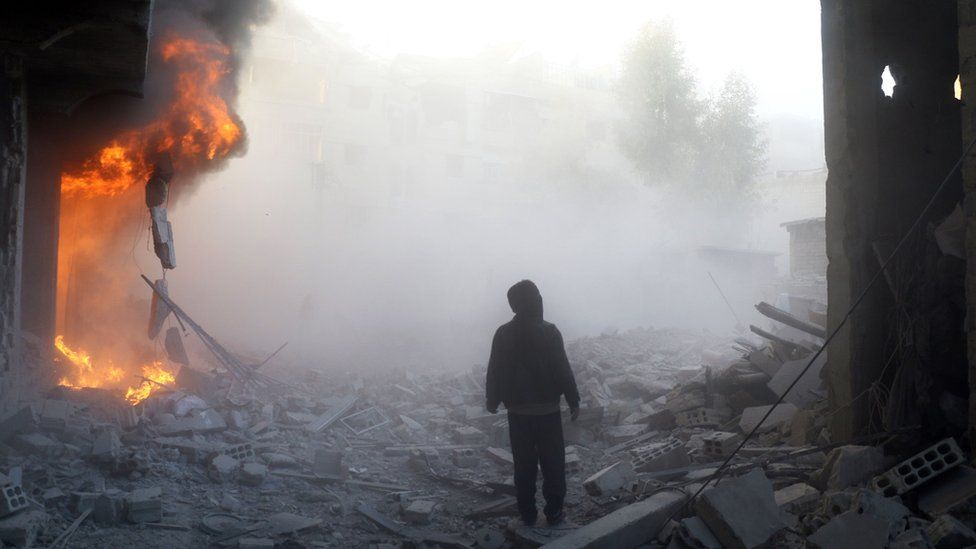Syria conflict: Can Saudi pressure secure peace?
- Published

Largely driven by the outrages perpetrated by the so-called Islamic State, the Syrian settlement process seems to have more or less passed its first major hurdle with the declaration on Thursday night from Syrian opposition and rebel groups pledging willingness to enter talks with Bashar al-Assad's regime.
But the process ran into its first major obstacle just a day later, with President Assad ruling out talking to what he depicted as "terrorists" posing as political organisations.
The Riyadh conference surpassed the expectations of many who believed it would fly apart under the contradictions of the disparate political and fighting groups taking part, many of which had boycotted earlier settlement efforts.
Those contradictions remain, but they were set aside in a common commitment to the vision of a pluralistic, democratic, inclusive Syria which must have been anathema to many of the hard-line Islamist fighting groups present.
One of them, Ahrar al-Sham, said it was pulling out because the closing statement "failed to assert the Muslim identity of our people".
But they were later reported to have had second thoughts and signed up "with reservations" - no doubt a product of Saudi pressures on a group Riyadh has strongly backed.
The incident underlined the key role the Saudis are playing in the settlement process, with an equally evident and strong American determination lying behind that.
The meeting decided to set up a "Higher Negotiations Authority" to direct the opposition's participation in the proposed talks with the regime early next year, and to select the negotiating team.
That leadership body is to remain based in Riyadh, giving the Saudis a permanent and ready handle on it.
'Two choices'
What is the price for such apparent Saudi dedication to the peaceful settlement of a conflict in which they, Qatar and Turkey have played a key role backing rebel groups battling government forces?
Probably the head of Bashar al-Assad and his inner circle, or the "symbols and pillars of his regime", as the opposition statement twice put it.
Even as the Riyadh conference was under way, the Saudi Foreign Minister, Adel al-Jubeir, repeated his country's insistence that Assad "has two choices: leave through negotiations, which would be fastest and easiest, or he will be removed by force".
The Riyadh conference made a slight compromise on that point, leaving aside the long-standing rebel demand that Assad & Co must depart in advance of any talks.
But the concluding statement insisted that he and his team must have no part in Syria's future, and that they must leave power at the start of the transition period which all the main outside powers agree should begin six months into the process under a new Governing Body.
That seems to be the bottom line for the Saudis and their allies. It is hard to see why else they would abandon the massive investment they have made in trying to bring about an Assad-free Syria at any price.
But it's a scenario that Assad himself adamantly ruled out shortly after the Riyadh meeting.
It is equally hard to see why the Russians and Iranians, who have invested even more massively in Assad's Syria, would give up what for both is a strategic investment to make way for a democratic new regime in which the Sunni majority would inevitably take over, just as the majority Shia did in Iraq.
The key to a compromise could lie in an important phrase in the opposition statement embracing "the principle of administrative decentralisation" as the basis for the future Syrian state.
That could be a codeword for the "soft partition" that some see as the only viable formula for Syria's future, whereby the warring parties would essentially keep the bits they already have, within a loose federation - except Islamic State, which would then be turned on by all the others.
It's a formula which could allow expression to the Islamism of many of the fighting groups and their supporters, and to the particularism of the Kurds, who have been left out so far, as they're not quite one thing or the other but see their future as "self-administration within a united Syria".
That, or a variant of it, is what the West and others see as the only realistic strategy to finish off the IS militants, since the available instruments - air power and limited ground support from Kurds and others - can do not much more than contain them, if that.
But even in that scenario, it seems the Saudis and their allies would still insist on the departure of President Assad and his inner circle as the price of coexistence rather than perpetual friction and running warfare.
Will that be an offer Moscow and Tehran cannot refuse? Or can they afford open-ended and ever more costly embroilment in the intractable conflict?
While such big questions remain hanging, there will be much wrangling in the run-up to the proposed January negotiations.
While the reaction of Iran and Russia to the Riyadh declaration was muted, they have pointed up an obvious contradiction on the other team.
Groups like Ahrar al-Sham are brothers-in-arms on the ground with the Nusra Front, the al-Qaeda affiliate which is close to IS in ideology if not in practice - and which is also branded a terrorist group by the international community even if it engages IS in turf battles.
So who is a terrorist, and who is a "moderate" worthy of inclusion in the settlement process?
President Assad lost little time in dubbing all the Riyadh participants as either terrorists or political hirelings of outside powers, neither of whom he would talk with.
The US Secretary of State was clearly right when he said there were still some "kinks" to be dealt with before talks could proceed.